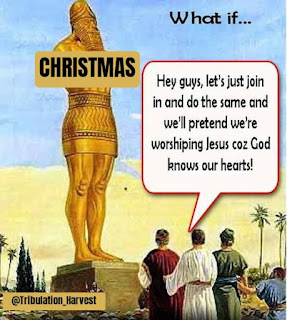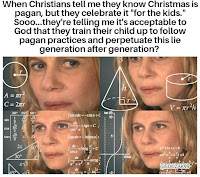Christmas is that time of the year where nostalgia hits us square in the face. We fondly remember Christmas past spent with loved ones who handed down family traditions in which we still joyously participate. We quietly reminisce about the glow of the lights on the tree, the music, decorating the house, buying and wrapping presents, and gathering together to eat those special holiday meals. The only part of the season that most dislike is when it ends, and everything needs to be taken down, boxed up, and put away in the attic or basement for another year.
Many years ago, I was sitting in a dark room with only the glow of the lights on the tree to keep me company. I had been contemplating the meaning of Christmas for the past couple of years and had converted all of my tree ornaments to Christian themed ornaments (Angels, doves, manger, etc...) thinking that I would have a Christ centered tree every season. As I sat there in the stillness of the night, looking at the lights on the tree, I suddenly understood that what I was looking at had nothing to do with Jesus, but was, instead, my attempt to Christianize those things that had nothing to do with the birth of Jesus. Was it the leading of the Holy Spirit? I'd like to believe so. It was then and there that I decided that when the tree and decorations came down after New Year's Eve, I'd never put them up or celebrate Christmas ever again.
That brings me to the very crux of this article. Should we, as a body of believers, continue to celebrate Christmas? I suppose that would depend on how we answer a few critical questions.
- Do the symbols of Christmas reflect the birth or life of Jesus? (Evergreen tree, wreath, candles in windows, yule log, holly, mistletoe, etc...). I'm not talking about gaslighting these pagan symbols and giving them new meaning to obfuscate their original and continued use by pagans (which is what's happened). I'm asking if any of these things were present and used to celebrate His birth.
- If they weren't originally used to celebrate His birth, then where did these symbols come from? What were their original meaning? Why is it not an issue that we've co-opted these symbols in order to worship God?
- Is there any scriptural or historical evidence that the early church chose one special day to celebrate the birth of Jesus?
- When was Christmas first celebrated, and what were the circumstances and reasoning surrounding it's creation?
- What were the original traditions of Christmas?
- Is Christmas a God ordained observance, like the High Holy Days in Judaism?
- Why does Jesus' birth seem to mean more to people on this day over all other days? Shouldn't we be celebrating the joy of His birth every day?
- What can I do for others on this day that I can't do for them any other day of the year?
- Why is it permissible to use pagan and secular symbolism and traditions and claim them in the name of Jesus? Does God have a history of recycling pagan idols, symbols, etc... in our worship or celebration of Him?
As we begin asking these and other questions, we can either shut our eyes and ears to the real answers and purposely gaslight ourselves, or we can listen to the truth of the matter... that Christmas is paganism and secularism wrapped in a pretty Jesus bow, and that we participate in the holiday in order to satisfy our own fleshly desires. One desire is to experience those nostalgic feelings brought on by the flood of memories from Christmas past. We hear the holiday music and dance to songs like, "All I Want For Christmas Is You" and "Rockin' Around The Christmas Tree." We unpack the decorations and as we do, we unpack our fond memories of every Christmas we've celebrated. We allow ourselves to be mesmerized by the glowing lights strung on the tree; lights that reflect off of the garland, tinsel, and ornaments, making the tree shine. We put lights in the windows and on the house to let everyone know we're celebrating Christmas. We put a wreath on the door and some of us put a display up in the front yard. It's all in keeping with our holiday traditions, which adds more fuel to the fire, so-to-speak, when it comes to strengthening those feelings of nostalgia. One more year down and one more link added to the nostalgia chain that keeps us bound to this holiday.
I know that by even suggesting the discontinuance of the celebration of Christmas, it brings up a lot of issues in the mind of the born again believers who still celebrate the day. One of the first issues in dealing with this decision is... "What about the children? They'll be crushed if we stop celebrating Christmas. I'll give it more thought, but I'll wait for the kids to grow up before cancelling Christmas, if that's what I decide to do." The problem with this, is that not only is this a compromise, but you'll also be perpetuating the cycle and passing it on to another generation. It's like compromising on Halloween when you decide to forbid dressing up as anything evil or scary. You might even limit their celebration of the day by only allowing them to go to the church "Trunk or Treat" event or Fall Festival where the children can still dress up in costume and receive treats (another compromise by the church, but that's another story). Many compromise on Halloween, so it's permissible to compromise on Christmas as well. "Sure, it's all pagan symbolism, but I'm going to choose to believe that it's all about Jesus."
Christians like to use the following scripture to justify their celebration of Christmas: "One man esteemeth one day above another: another esteemeth every day alike. Let every man be fully persuaded in his own mind. 6He that regardeth the day, regardeth it unto the Lord; and he that regardeth not the day, to the Lord he doth not regard it." (Romans 14:5-6a) There's one major flaw about quoting this scripture. It has nothing to do with pagan celebrations. You can't "regardeth it unto the Lord" if it's a pagan celebration. This scripture doesn't give permission for born again believers to indulge in pagan practices and celebrations, so this portion of scripture has been cherry picked and has been used ineffectively to defend an indefensible position. In fact, in 1Thess 5:22, we're instructed to, "Abstain from all appearance of evil." We're not told just to abstain from evil, but to abstain from even the "appearance" of evil.
So even if we're not intentionally doing anything evil, we're told that our actions are a reflection of our personal walk with the Lord. That being the case, we're not even to allow ourselves to participate, however innocently, in anything that could be perceived as evil. If you take that full circle, we can say that although we're not purposely practicing true paganism, we shouldn't be using their pagan symbolism and traditions to celebrate the birth of Jesus, no matter how innocent our actions are or how strongly we believe that it's acceptable to God, because it has the "appearance of evil." So are Rom. 14:5-6a and 1Thess. 5:22 in conflict? No, because who would participate in a pagan celebration and regard it unto the Lord?
Who sees the celebration of Christmas as a pagan practice... an appearance of evil? Pagans. They actually see the folly of Christians using pagan symbolism and participating in pagan practices in order to celebrate the birth of Jesus. In fact, pagans encourage us to do so, because they enjoy watching "religious" people ignorantly compromising their faith. Born again believers who have had a change of heart toward the holiday also see the symbols of Christmas as compromised Christianity. So yes, it has an appearance of evil.
Christians also like to use the phrase, "God knows my heart." It's true that God knows your heart, but if your heart knows that the symbolism of Christmas has nothing to do with the birth of Jesus, then He knows you're ignoring that knowledge and that you're consciously using pagan symbolism to worship Him. He knows that you're participating in order to continue celebrating a holiday that feeds your flesh and is perpetuated, by your actions, in the next generation of born again believers. Take any other symbol of paganism and idol worship and try to pass it off as Christian. You wouldn't get away with it. Then why do we slap a Jesus bow on other pagan symbols and traditions and call it acceptable? It's a contradiction, and one that can't be explained away by saying, "God knows my heart."
I encourage you to seek the Lord, and to honestly open yourself up to the possibility that the celebration of this holiday may not be pleasing to the Lord. Celebrate Jesus birth, life, death, and resurrection 24/7/365. You have the opportunity to help those in need all year long by offering them monetary assistance, food, clothing, and by sharing the message of salvation. Too many people wait until December 25th to reach out to others and do something special for them. As I've come to say often, "There's nothing you can do for someone on December 25th that you can't do for them any other day of the year." You can't love Jesus more on that day either, because that would mean you aren't loving him to your full capacity every other day of the year.
Not everyone is ready to hear this message or to accept it. I understand that. Please let me know what you think by using the comment section below.
REPENT, AND BE FORGIVEN!
BELIEVE, AND BE SAVED!
TRIBULATIONHARVEST.NET






No comments:
Post a Comment